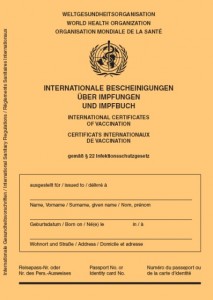Vaccinations & Health
April 1, 2012 in Travel preparations
When planning a trip like ours it is difficult to find the balance between irrational fear of dangerous diseases in foreign countries and a reasonable protection for travelling.
We have decided to go for an extensive protection through vaccinations, simply because we don’t want to have our travel experiences to be spoiled by potential dangerous or even life-threatening diseases – at least as far as we can control it. Furthermore, vaccinations bear only minor risks nowadays and we don’t see why we shouldn’t do it.
In the end, everybody has to decide for himself. Therefore, please treat our information here not as general instructions or recommendations – we are not medical doctors. The following information is a general report of our experience and our personal view.
We will be travelling with immunisation protection against the following diseases:
– Polio
– Diphtheria
– Tetanus
– Pertussis
– Measles
– Hepatitis A
– Hepatitis B
– Rabies
– Japanese Encephalitis
– Typhoid Fever
In addition, we have already vaccinations against tick born encephalitis, tuberculosis and smallpox.
Why we decided to go for immunisation against those diseases:
Polio, Diphtheria, Pertussis und Tetanus – these diseases are easy to get and very dangerous. Therefore they are often part of a basic immunisation protection most people have, but which has to be renewed regularly.
Measles – we both don’t remember suffering from this typical children’s disease. In many countries measles are still quite common, and can be dangerous – especially when you get it as an adult.
Hepatitis A and B are common in less developed nations. Even though Hepatitis B is only transferred by body fluids, we consider those vaccinations important, because hygiene in hospitals may not be at standards we are used from western countries, and e.g. injection needles may have been used before.
Japanese Encephalitis: we decided to get this vaccination due to our route throughSouth East Asia. The disease is transmitted through mosquitoes, which are common in rice fields, and it is almost always deadly. Apparently, travellers are only very rarely infected. But since we love to travel remote and rural areas, and like to stay in little villages, we don’t want to take unnecessary risks.
Rabies is very common inIndia. There is no other country with a higher number of people dying through this disease. Infection mostly occurs after bites by stray dogs – the risk is rather high in rural areas. It is still possible to get the vaccination afterwards, but within only few hours; and this is not easy and guaranteed when travelling off the beaten track. So we rather go for vaccinations before we leave.
Links for further information:
– http://wwwnc.cdc.gov/travel/page/vaccinations.htm
– http://www.nhs.uk/Planners/vaccinations/Pages/Travelvaccines.aspx
Malaria
Malaria prophylaxis is out of the question for us. Firstly, because we will be travelling too long in endemic regions to take the pills all the time and secondly, they have quite often side effects that can spoil the journey. Furthermore, many malaria strains are resistant against the common medication – probably because they have been prescribed for prevention too often. In countries where malaria is common, doctors know exactly how to treat it – presumably, much better than doctors at home. So we feel in safe hands in case we catch malaria in those countries.
Travel Firs-Aid Kit
Our first-aid kit for the journey includes the most important things for emergencies:
– Emergency dressing material
– Ointment for little cuts, burns, insect bites
– Painkillers – stronger ones in case of an accident and serious injury, and some Paracetamol for “everyday” use and against fever
– Imodium – because diarrhoea will occur inevitably – sooner or later. A little tip: Imodium is available and very cheap in most pharmacies in Asian countries – apparently they need it quite often….
– Clinical Thermometer
– Broad-spectrum antibiotic – always good to have in case of a serious infection.


